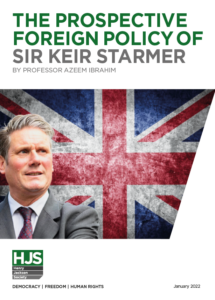 Sir Keir Starmer’s approach to foreign policy is “more assertive and more serious than that of any Labour leader since the general election of 2010 but still has serious gaps”, according to Professor Azeem Ibrahim, an award-winning international relations academic who advised the Biden Campaign on foreign policy and whose papers warning of the impact of Jeremy Corbyn’s foreign policy made front-page-news in 2019.
Sir Keir Starmer’s approach to foreign policy is “more assertive and more serious than that of any Labour leader since the general election of 2010 but still has serious gaps”, according to Professor Azeem Ibrahim, an award-winning international relations academic who advised the Biden Campaign on foreign policy and whose papers warning of the impact of Jeremy Corbyn’s foreign policy made front-page-news in 2019.
In ‘The Prospective Foreign Policy of Keir Starmer’, published today by the Henry Jackson Society, Prof Ibrahim analyses the foreign policy strategy of Sir Keir Starmer in opposition, and looks ahead to how a Starmer government might react to future crises.
Prof Ibrahim characterises the policy under Sir Keir Starmer as having a focus on process and formality but having restored the Labour Party to many of its foreign policy positions prior to the election of Ed Miliband in 2010.
The paper challenges Sir Keir Starmer to establish a fuller vision for his foreign policy leadership, claiming that the doctrine is “rougher and less well-formed than the Labour leader might suggest”. The report also contrasts Sir Keir Starmer’s positive foreign policy positions since taking the leadership of the Labour Party to those he adopted prior to that point which, according to Prof Ibrahim, “have not painted his capacity to make difficult, non-ideological decisions in a favourable light”.
Overall Professor Ibrahim finds that, under Sir Keir Starmer, Labour’s foreign policy is likely to:
- Favour maintaining Britain’s existing alliances but be unlikely to establish new ones.
- Evidence ideological support for Joe Biden’s foreign policy and for the broad goals of the European Union.
- Oppose the revisionist illiberal powers in Europe, including Viktor Orban’s Hungary and Vladimir Putin’s Russia.
- Seek to work with other states on a case-by-case basis in relation to, for instance, climate change and decarbonisation.
The paper recommends that the Labour Party seeks to create a foreign policy doctrine of similar scope and depth to the Integrated Review, published by the Government in 2021. If no such effort is made, the author concludes that “the Labour Party risks entering government unprepared and without the capacity to make significant foreign policy decisions”.
Prof Ibrahim identifies a particular need to set out a vision for global leadership that would see the UK play a major role in containing Chinese expansionism, or a new counterterrorism mission in the greater Middle East or the Sahel, or in carrying out strikes to punish the use of chemical, radiological, biological or nuclear weapons.
The paper marks the first major study of the Labour leader’s foreign policy approach. As the paper identifies, Sir Keir’s career has seen him commit little to the record in terms of foreign policy philosophy.
Read the report here
“This is the first major assessment of Sir Keir Starmer’s foreign policy since he took over the leadership of the Labour Party. Like most report cards, it is a mixed picture, but Sir Keir can take credit for restoring the Labour Party’s foreign policy standing to closer to the party’s norm, before the aberrations of the previous ten years.
‘However, if the Labour Party is – as Sir Keir says it is – a government in waiting, the time has come to set out a positive vision for Labour’s foreign policy that lets our adversaries and allies know the tenor it will take.”
Prof Azeem Ibrahim


